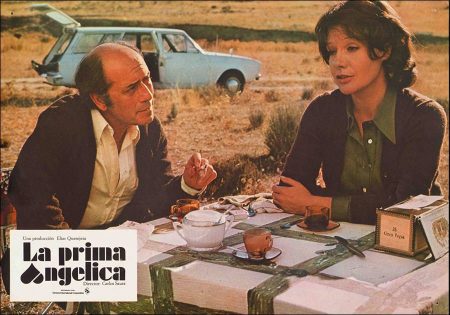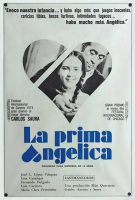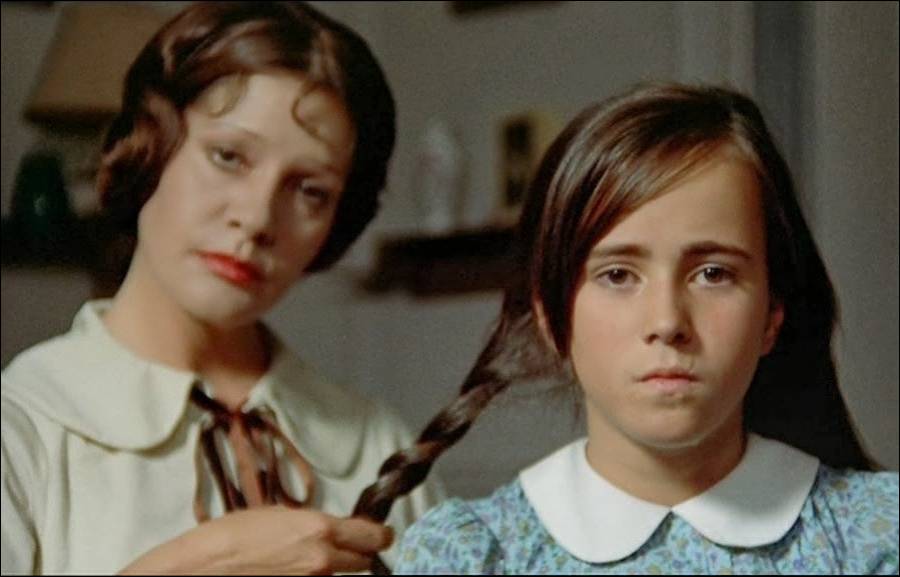La Prima Angélica movie storyline. When the single middle-aged Luis travels from Barcelona to bury the remains of his mother in the vault of his family in Segovia, he is lodged by his aunt Pilar in her old house where he spent his summer of 1936 with her. He meets his cousin Angelica, who was his first love, living on the first floor with her husband and daughter, and he recalls his childhood in times of the Spanish Civil War entwined with the present.
La Prima Angélica (English title: Cousin Angelica) is a 1974 Spanish drama film directed by Carlos Saura. Starring José Luis López Vázquez as a middle-aged man whose memories of his childhood during the Spanish Civil War make him reenact his past as the mature man he is today. The film was entered into the 1974 Cannes Film Festivali and was highly controversial in Spain.
Overview fo the Film
The initial idea for the film came from a specific reference to a cousin Angélica, in a scene from Ana and the wolves (Spanish: Ana y los lobos), director Carlos Saura’s previous work. In Ana and the wolves there is an inconsequential bit of dialogue that occurs in the private conversation between the family matriarch and the title character. The old woman speaks of a certain cousin Angélica who, as a small child, coquettishly played with one of her sons. Building on that allusion, Saura and writer Rafael Azcona developed a script about the childhood memories of a man now in his mid forties and his flirtatious cousin, Angélica, on whom he had a crush when he was ten years old. These memories become the lure for the protagonist’s reencounter of his long suppressed past.
The film is told as a labyrinthine montage of recreated memories that surface in the waking consciousness of the vanquished past that the protagonist cannot bring himself to confront. The problem for Saura was how to integrate past and present in a coherent narrative. A character who will continuously and seamlessly move form one period of time to another without resorting to the habitual flashback, but rather showing a past which is constantly being recaptured and lived as a present. The idea for this came from a phrase from Ramón del Valle-Inclán : “Things are not as we see them, but as we remember them.”
Saura described Luis, the main character in the film a someone who was profoundly touched by the Civil War. Personally, Saura explained, “I never agreed with the widespread idea that childhood years are the golden years of one’s life – maybe because of my own experiences. On the contrary, it seems to me that childhood is a particular uncertain period because, among other reasons, one’s childhood is lived almost entirely in an in-between world, and unfolds in a world of great fears and great needs of all kinds. And all of that leaves profound, indelible scars, particularly when one has to live in a hostile environment, like the main characters in the film.
The theme of interdicted history, the Spanish Civil War years as remembered by a child of Republican parents, Saura confronted the censors. The film’s sense of liberation comes from its directness in depicting a number of scenes in which the Nationalist cause is either ridiculed or presented as inspired more by petty animosity than by patriotic or religious fervor.
Given its political subject matter, the first two versions of the script were rejected outright by the censors. A third version was finally approved and, after some delays, the finished film was accepted for distribution without cuts.
La Prima Angélica (1974)
Directed by: Carlos Saura
Starring: José Luis López Vázquez, Fernando Delgado, Lola Cardona, Lina Canalejas, María Clara Fernández, Pedro Sempson, Julieta Serrano, Encarna Paso, Josefina Díaz
Screenplay by: Carlos Saura, Rafael Azcona
Production Design by: Francisco Nieva
Cinematography by: Luis Cuadrado
Film Editing by: Pablo González del Amo
Costume Design by: Maiki Marín
Set Decoration by: Elisa Ruiz
Art Direction by: Fernando Hermoso
MPAA Rating: None.
Distributed by: New Yorker Films (1977) (USA), Cinem. Intern. Corpo. (Spain)
Release Date: May 12, 1977 (New York City), April 29, 1974 (Madrid)
Views: 277





